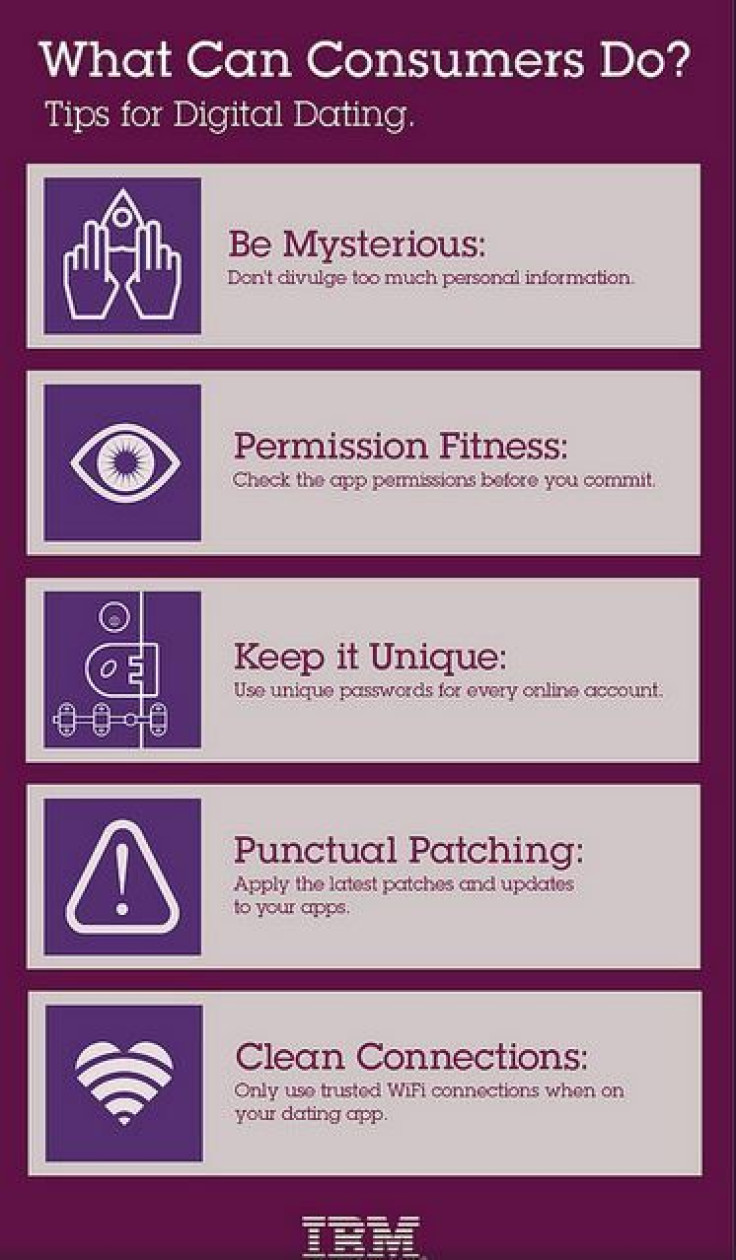Dating App Advice 2015: More Than 60 Percent Of Dating Apps Vulnerable, How To Protect Your Profile

Valentine’s Day is just around the corner, and for singles, that means turning to apps like Tinder, The Grade, Happn, Coffee Meets Bagel and OkCupid to meet last-minute sweethearts. But proceed with caution -- an analysis conducted by IBM Security discovered that more than 60 percent of those types of dating applications aren’t secure – and could potentially be vulnerable to various cyber attacks that could steal an individual’s personal information.
Forty-nine percent of well-known dating apps have access to users’ billing information, and 73 percent of popular dating apps have access to users’ current and past physical location via GPS. Thirty-four percent of dating apps also have access to the camera on a user’s smart phone. Users are generally aware of this when they sign up, but most likely unaware that this information could be susceptible to hacking from outside sources. The company analyzed 41 of the most popular dating apps and concluded that a staggering 63 percent were vulnerable to attacks.
“Many consumers use and trust their mobile phones for a variety of applications. It is this trust that gives hackers the opportunity to exploit vulnerabilities like the ones we found in these dating apps,” said Caleb Barlow, Vice President of IBM Security on Wednesday. “Consumers need to be careful not to reveal too much personal information on these sites as they look to build a relationship. Our research demonstrates that some users may be engaged in a dangerous tradeoff – with increased sharing resulting in decreased personal security and privacy.”
While millions of users may view apps like Tinder and Happn as a convenient way to meet romantic prospects, they’re not aware of the massive amount of personal data that could be breached from their usage. Dating apps are a potential goldmine for outside sources – and millions of people regularly use dating apps. In November of last year, Tinder told the Huffington Post that the average Tinder user spends 77 minutes a day on the app.

There are several concerns when it comes to the vulnerability of dating apps, and IBM identified the following scenarios are particularly likely:
Malware – Some vulnerable apps could be altered by hackers to send an alert that asks them to click on a link or retrieve a message that’s really a malicious link.
GPS – Many apps like Tinder and Happn rely on a user’s location to search for potential matches. This can easily be utilized to discover where a person lives, works or regularly spends their time.
Billing Data – Nearly half of the 41 apps surveyed can access a user’s credit card information if it’s saved on their smart phone. A hacker can find this information through coding.
Access to Microphone or Camera – Yes, someone can access your phone’s camera or microphone, even if you’re not using the app. This means they can spy on you whenever your phone is nearby and listen to your conversations.
What can users do to prevent their information from falling into the wrong hands? Besides staying off dating apps altogether, IBM suggests not divulging too much personal data to strangers, using different passwords for each dating account, using only trusted WiFi connections and updating your apps regularly. It’s likely millions of users will continue to use dating apps while knowing the risks they pose, since it’s estimated that popular app Tinder will reach 50 million users by the end of 2016.
© Copyright IBTimes 2024. All rights reserved.












